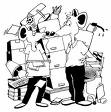PSYCHOLOGY OF A PACK RAT

Are you a Pack Rat? If not, do you know someone who is?
I thought this interesting article about the psychology of a pack rat by Cynthia Kincaid was very interesting, fun and informative. I hope you do too.
Psychology of a Pack Rat
What's Mine is Better than Yours
Baylor Innovations, Fall 2008
DO YOU EVER WONDER WHY YOU MIGHT NOT be able to throw anything away? Are your garage and closets bursting from all the things you have collected over the years: old college T-shirts, out-of-date clothing, sports equipment and rarely used furniture gathering dust? A new study just might have the answer.
New research highlights the neuropsychological connection people have to their possessions, especially when they anticipate the possible loss of those belongings. The study, published in Neuron, found that people tend to prefer things that they own. They believe their possessions have more positive features than items that do not belong to them, even if they have owned the objects for only a short time. “When you get something, you just can’t stand the thought of losing it. People don’t like the thought that they might be deprived of that thing,” says Brian Knutson, Ph.D., study author and associate of psychology and neuroscience at Stanford University.
This Phenomenon is known as the “endowment effect” and can sometimes result in self-sabotaging behavior. “People ask for twice as much to sell something as they would pay to buy that same thing,” says Dr. Knutson. “This effect exists regardless of market conditions.”
STUDY DESIGN
To conduct the study, Dr. Knutson gathered a group of people and gave half of them mugs and half of them pens of equal value. He then asked how many would like to trade. “In a class of 100 to 200 people, only a handful of people wanted to do the trade,” he says.
During the study, Dr. Knutson’s subjects also bought and sold items such as noise-canceling headphones, iPod© Shuffle music players, iPod© alarm clocks, flash drives and other items ranging in price from $60 to $80. Participants were randomly given two items to keep before the experiment began. When it came to buying and selling, the subjects wanted twice as much to sell the items than they were willing to pay for them.” There was no difference in how long they had owned these things; they had just gotten them,” Dr. Knutson says.
While the buying and selling went on, Dr. Knutson had his subjects’ brains scanned to determine activity in different parts of the brain. “Our hypothesis was that people wouldn’t want to lose what they had, and that’s why they jacked up the asking price,” says Dr. Knutson. “The other theory was that they would like what they had better and that would jack up the price.” Dr. Knutson found evidence for the first hypothesis. “When people looked at objects that they might sell, especially if they liked those things to begin with, we saw more activation in areas of the brain associated with anticipating loss. But we didn’t see any more activation in the area of the brain associated with anticipating gain.”
WHAT DOES ALL OF THIS MEAN?
According to Dr. Knutson, people lose money (sometimes lots of it) because of their attachment to things and the resulting endowment effect. “This isn’t some parlor trick that psychologists play on people,” he says. “This is a real effect that influences how efficient people are with their market transactions, and it can cost them a lot of money.”
Dr. Knutson points to examples such as the costs that people incur when selling houses or cars or when moving ratty, out-of-date furniture across the country because they simply can’t part with it and paying storage fees every month for items they are unwilling to sell or give away.
Because of the endowment effect, Dr. Knutson advises hiring a real estate agent to sell your next home. “They don’t feel the pain of selling your house that you feel,” he says. “It’s their job to get you halfway in meeting the buyer, who is probably going to undervalue your home.”
He offers the same advice for other types of transactions as well. “If you have something valuable, and you want or need to sell it, it might be wise to have someone else sell it for you. They may do a better job of getting it sold.
For ideas on paring down your possessions, visit www.guynameddave.com and look for the 100 Thing Challenge.
[end of article]
I hope you found this article on Psychology of a Pack Rat as interesting as I did.
I included this information for those who have a tendency to be a pack rat or live or know someone who is. Apparently, there is a tendency in all of us to be a pack rate. It's a trait we all share as human beings. Who knew??
Since the topic of "pack rat" is universal, I will keep a look out for more information on the subject.
Links to Other Information
Here are some links to other issues:
Go to: ADD-ADHD
Go to: ADD & Organizing
Go to: Causes of Stress
Go to: Clutter Help
Go to: Compulsive Hoarder
Go to: Helpful Articles
Go to: Procrastinate
Go to: What is S.A.D.
Here are the links to help you get started with your next organizing project.
Go to: Step #1: Start Here
Go to Step #2: Organized Mindset
Go to Step #3: Questions to Ask Yourself
Go to Step #4: Start Somewhere
Go to Step #5: Baby Steps to Declutter
Go to Step #6: Basic Principles of Organizing
Go to Step #7: Other Things to Consider
Go to Step #8: Last Things to Consider
Click the lavender bar on the left and subscribe to the RSS feed to be notified of new listings as they become available.
Did you like this? Please share it! Thanks in advance.
No matter where you are in life (stay-at-home mom, full or part time employee, retired, etc.) you can make a good income with a website. Whether you write books, make crafts or something else, I highly recommend SBI. It's the reason for this website. Check it out below and become another solopreneur!
Hello! This is Shelly Morton, the author of this website. I know you hear a lot of hype about making money from home and building a successful website. I speak from experience as a solopreneur, I have succeeded with Solo Build It! There is simply no better way to build an online business. Nothing else compares. It's not a "get rich quick" scheme. SBI provides you with all the tools and tips you need to be successful. You put in the work and SBI will help you succeed! SBI is simply the BEST way to get started for any "solopreneur."
Return to top of Psychology of a Pack Rat




